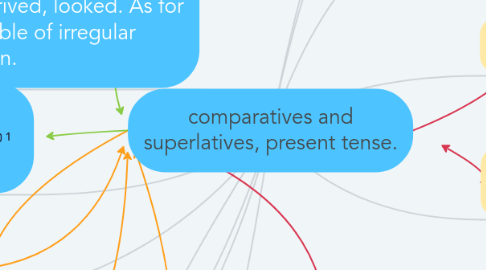comparatives and superlatives, present tense.
저자: Eunice Hernandez

1. examples: affirmative: i have walked. negative:I haven't walked. interrogative: Have I walked?
2. For adjectives ending in "and" is changed to "i". example: dry- drier For adjectives that have more than two syllables we use "more" example: expensive- more expensive.
3. For the adjectives that end with the letter "e", only add at the end "est". example: wide- the widest.
4. For short adjectives ending in vowel + consonant you must fold the consonant and add "est". example: fat- the fattest.
5. For the clauses of more than two syllables we use the word "most" plus the adjective in its original form. example: happy- the most expensive.
6. The present perfect of any verb is composed of two elements: the appropriate form of the auxiliary verb to have (present) and the "past participle" of the main verb. The form of the "past participle" of a regular verb is root + ed, e.g. Played, arrived, looked. As for irregular verbs, see the table of irregular verbs in the 'Verbs' section.
7. For most of the adjectives of a syllable we form the superlative by adding "est." example: small-smalest.
8. Comparative adjectives, we use them when we compare two people or things.
9. For most of the adjectives with a single syllable to the ending "er" to form its comparativos. example: small- smaller.
10. rules
11. For short adjectives ending in "e", just add "r" example: nice- nicer, cuide-cuider.
12. For adjectives ending in a vowel and consonant, make double consonant add "er". example: big-bigger, fat-fatter.


